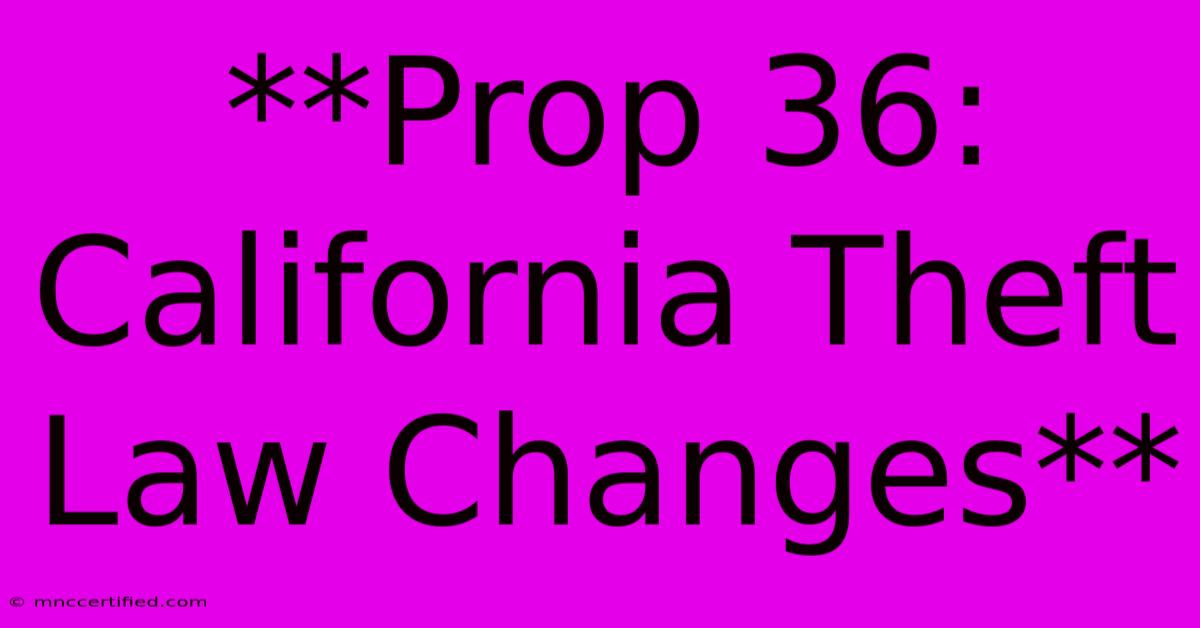**Prop 36: California Theft Law Changes**

Table of Contents
Prop 36: California Theft Law Changes – What You Need to Know
California voters approved Proposition 36 in November 2020, significantly impacting the state's theft laws. This proposition aimed to reduce California's prison population and promote rehabilitation by focusing on drug treatment and other programs instead of incarceration. This article will delve into the key changes introduced by Prop 36, its potential impact on crime rates, and how these changes affect individuals accused of theft crimes in California.
What Does Prop 36 Change?
Prop 36 primarily impacts the sentencing of individuals convicted of non-violent, low-level theft crimes. Here's a breakdown of the key changes:
- Elimination of Mandatory Prison Sentences for Non-Violent Theft: Prop 36 eliminates mandatory prison sentences for non-violent offenses like petty theft, grand theft, and shoplifting. This means that judges now have the discretion to sentence individuals convicted of these crimes to probation, community service, or drug treatment programs instead of prison time.
- Focus on Rehabilitation: Prop 36 emphasizes rehabilitation over incarceration. Individuals convicted of eligible offenses are now more likely to receive access to drug treatment, mental health counseling, and job training programs. The goal is to address the root causes of crime and prevent recidivism.
- Eligibility Criteria: Prop 36 applies to individuals convicted of non-violent theft crimes, excluding those with prior violent offenses or certain felony convictions.
Impact on Crime Rates
The impact of Prop 36 on California's crime rates is a subject of ongoing debate. Supporters argue that the focus on rehabilitation and reduced incarceration will lead to lower crime rates in the long run. They point to evidence suggesting that prison time can sometimes exacerbate criminal behavior.
However, critics express concern that the reduced penalties for theft could lead to an increase in crime. They argue that the perception of lenient punishment may encourage criminal activity.
What Does This Mean for Individuals Accused of Theft?
If you are facing charges for a theft offense in California, understanding the implications of Prop 36 is crucial.
- Increased Chance of Probation: Prop 36 significantly increases the likelihood of receiving probation instead of prison time, especially for first-time offenders.
- Access to Rehabilitation Programs: If you receive probation, you may be eligible for drug treatment, counseling, and other programs designed to address the underlying factors contributing to your criminal behavior.
- Importance of Legal Representation: Navigating the complexities of Prop 36 requires skilled legal representation. An experienced criminal defense attorney can advise you on your options, negotiate with prosecutors, and build the strongest defense possible.
Conclusion
Prop 36 represents a significant shift in California's approach to non-violent theft crimes. While the long-term impact on crime rates remains a topic of discussion, the proposition emphasizes rehabilitation and seeks to address the underlying causes of criminal behavior. Individuals facing theft charges in California should consult with legal professionals to understand their rights and potential outcomes in the context of this new law.
Keywords: Prop 36, California, theft law, non-violent theft, rehabilitation, prison sentencing, probation, drug treatment, crime rates, legal representation, criminal defense attorney.

Thank you for visiting our website wich cover about **Prop 36: California Theft Law Changes** . We hope the information provided has been useful to you. Feel free to contact us if you have any questions or need further assistance. See you next time and dont miss to bookmark.
Featured Posts
-
Understanding Project 2025 The Facts
Nov 07, 2024
-
New York Lawmakers 4 Priorities Before Trumps Return
Nov 07, 2024
-
Election Updates Breed Behind In Sf
Nov 07, 2024
-
How To Start A Real Estate Investment Fund
Nov 07, 2024
-
Long Term Disability Insurance Overpayment
Nov 07, 2024